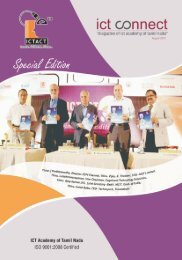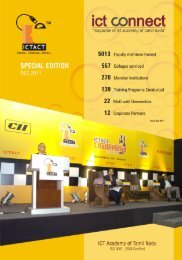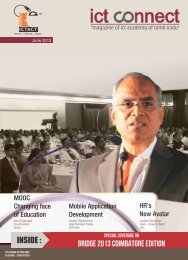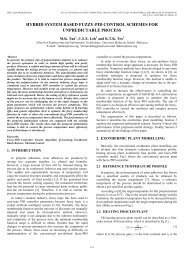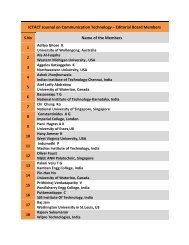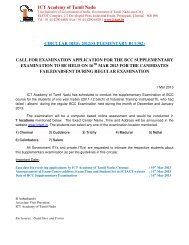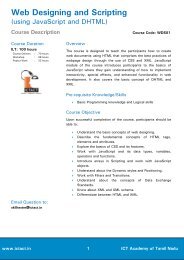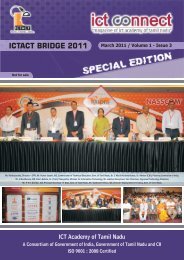Issue 1 - ICTACT.IN
Issue 1 - ICTACT.IN
Issue 1 - ICTACT.IN
You also want an ePaper? Increase the reach of your titles
YUMPU automatically turns print PDFs into web optimized ePapers that Google loves.
magazine<br />
The Value of Certification for IT Professionals<br />
By Todd Thibodeaux<br />
President and Chief Executive Officer, CompTIA<br />
The rapid evolution of technology makes it<br />
difficult to pinpoint “the next big thing,” but the outlook<br />
for information technology (IT) employment remains<br />
promising. Technology permeates every sector of the<br />
economy. From manufacturing to retail, healthcare to<br />
agriculture, and financial services to education,<br />
technology helps to make products or deliver services<br />
faster, better and more efficiently.<br />
with computer science capturing the largest share (31<br />
percent). The study also confirmed that certification helps<br />
many individuals enter the IT field through a nontraditional<br />
path. For example, many with a business<br />
degree (21 percent) were able to boost their career<br />
prospects through complementary skills. These nontraditional<br />
path certification holders serve an important<br />
role in the IT workforce.<br />
Technology-intense industries require highly<br />
skilled workers. IT training and certification serve a vital<br />
role in helping to meet the demand for skilled technical<br />
workers. This is further confirmed by the international<br />
research firm IDC, which expects worldwide certification<br />
revenues to grow by an average of around 5 percent over<br />
the next few years. In some critical areas, such as security<br />
and networking, growth rates will be much higher.<br />
Millions of individuals around the world hold IT<br />
certifications. Collectively, IT professionals spend<br />
millions of hours preparing for certification exams. In all,<br />
significant resources are devoted to IT training and<br />
certification. In 2009, CompTIA, the leading non-profit<br />
trade association for the world’s IT industry conducted a<br />
survey of more than 1,500 IT professionals worldwide to<br />
better understand their reasons for obtaining an IT<br />
certification and how it has affected their careers.<br />
The survey revealed that the typical IT professional<br />
holds an average of 1.2 industry certifications, while 17<br />
percent of those surveyed have three or more<br />
certifications. Workers employed by IT companies and<br />
by government entities are most likely to be certified, but<br />
individuals employed in other industries also reported a<br />
high level of certification.<br />
The profile of certification holders reflects the<br />
diversity of IT jobs. Among workers in the CompTIA<br />
study holding a certification, the data suggests that<br />
slightly over half of the holders have a four-year college<br />
degree or higher. Among those with a college degree,<br />
about half of them majored in a science or math,<br />
16<br />
Certification Drivers<br />
Like many career-related investments, economics<br />
remains a key driver of IT certifications. Professionals<br />
investing time and money, not to mention the<br />
opportunity cost of the investment, expect a financial<br />
return. Eighty-eight percent of certification holders in the<br />
CompTIA survey indicated they pursued a certification to<br />
enhance their résumé. Additionally, 50 percent use<br />
certification to facilitate a job or career change.<br />
Economics is important, but it’s not the only reason for<br />
pursuing a certification. Personal growth also factors<br />
heavily into the decision. An identical 88 percent indicate<br />
that personal growth is a major or minor reason in their<br />
decision to pursue a certification. This confirms that many<br />
professionals are truly committed to the IT field and take<br />
pride in developing their skills and showcasing their<br />
expertise. Perceptions of value are shaped by real world<br />
examples and firsthand experiences. In the area of<br />
promotions, bonuses and other economic benefits, about<br />
half of certification holders have a positive firsthand<br />
experience. Fourteen percent of certification holders<br />
receive a salary increase, while nine percent received a<br />
promotion. Additionally, 19 percent receive some other<br />
type of recognition, such as acknowledgement among<br />
peers for the accomplishment or other benefit such as time<br />
off.<br />
IT professionals knowingly and in some cases<br />
unknowingly use what they learn from certification<br />
preparation long after the actual exam. Overall, 82 percent<br />
ICT CONNECT MAGAZ<strong>IN</strong>E



